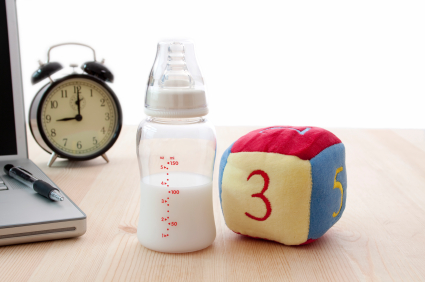Rights And Benefits For Working Parents
Being a parent is always a challenge and juggling parenthood with employment even more so. Since employers vary widely in their attitude towards working parents, it can be useful to understand what rights and benefits are available.
Rights for Working Parents
The three most important rights for working parents are:
1. The right to request flexible working.
2. The right to take reasonable time off to deal with an emergency involving a child.
3. The right to take unpaid parental leave to look after their child's welfare.
The Right to Request Flexible Working
It should be noted that the parental right is the right to request flexible working rather than the automatic right to a flexible working pattern. What the relevant legislation means is that employers must consider any request seriously and hold a meeting to discuss it with the employee in question within 28 days. They must then provide a written response within 14 days of this meeting.
If the request for flexible working is refused, there must be a clear business justification for it. Essentially, an employer can decline a request for flexible working if they can demonstrate that it would create unreasonable pressure on the business. In the event of a refusal, the employee has 14 days to appeal showing why the employer's reasons are incorrect after which the employer and the employee should have another meeting to discuss the request.
The best approach to take when preparing a request for flexible working is to be as specific as possible about what is being requested and why, and to look at the situation from the employer's perspective to pre-empt any potential objections and highlight any benefits to them. For example, if employers are short of office space, home working may be of mutual benefit. It may also be worthwhile to see if there is any way to show flexibility towards the employer. For example, if a request is made for flexibility with shifts, it may be worth seeing if it would be possible to work an unpopular shift on an occasional basis.
Requests for home working are often particularly contentious as many employers continue to view remote working with suspicion, especially when it is known that there are children in the house. That being so, it is advisable to highlight what steps will be taken to create a suitable working environment in the home (particularly with regards to sound proofing and to ensuring that the working parent is kept off limits to children). It may also be helpful to suggest ways in which productivity can be measured and to highlight how a home working environment can lead to improved performance; for example, by allowing for greater concentration, free from the distractions of an office.
Should the employer and the employee be unable to come to an agreement regarding flexible working, then the employee may wish to take legal action. This is, however, a significant step and should normally only be taken after legal advice.
The Right to Take Reasonable Time Off to Deal with an Emergency Involving a Child
For the purposes of employment legislation for working parents, an emergency is classed as illness, injury or assault. It may also cover disruption of care arrangements, such as a nursery being forced to close unexpectedly. This right does not cover foreseeable instances such as dentist appointments or school holidays and the leave taken may be unpaid.
The definition of 'reasonable' is left open, but is generally taken to mean one or two days. Employees are expected to make reasonable efforts to return to work as quickly as possible. Again, the definition is left open. An example of how this might work in practice is a parent taking a day off work in the case of a sick childminder but making alternative arrangements from then until the usual childminder is better.
The Right to Take Unpaid Parental Leave to Look After a Child's Welfare
This right differs from the right to take time off during an emergency in that it is intended to cover foreseeable events such as hospital appointments or visits to new schools. From March 8th 2013, parents will be able to take a total of 18 weeks parental leave from the time of their return to work after maternity/paternity leave to their child's 18th birthday. (At the current time it's 13 weeks up to the child's 5th birthday except in special circumstances). An employer is only obliged to permit an employee to take a maximum of 4 weeks leave per year (although they may choose to give more).
With reference to this legislation, the term 'week' refers to the number of hours an employee habitually works per week, hence for part-time workers a week may equate to 20 hours or 2.5 work days. This leave is unpaid and is calculated per child rather than per year or per job. Therefore, if an employee takes 4 weeks leave in the first year after their child's birth, they have a total of 14 weeks leave to take until the child's 18th birthday. It should also be noted that this leave is not intended (or remotely sufficient) to grant employees the automatic right to time off during the school holidays.
Working Tax Credits
Working parents may also be eligible for government sponsored benefits and tax credits.
To qualify for working tax credits, single parents need to be working a minimum of 16 hours a week, while couples need to be working a minimum of 24 hours per week between them with one parent working at least 16 hours a week. It is acceptable for only one half of a couple to work provided that the working parent works at least 24 hours. There are some exceptional circumstances in which couples may qualify for working tax credits with fewer than 24 weekly working hours between them, but even in these circumstances, one half of the couple must be working at least 16 hours a week.
To claim working tax credit, it should be expected that the employment will continue for at least 4 consecutive weeks and the credit will stop if a strike continues for more than 10 consecutive days. Under normal circumstances, it will be possible to continue to claim working tax credit for temporary absences from jobs such as illness or for brief periods (of less than 4 weeks) between jobs. At the current time, the standard amount of working tax credit is up to £1,920 a year although more or less may be granted depending on circumstances.
Working tax credit is available to self employed people; however as with all matters relating to self employment and tax, the onus is very much on the self employed individual to keep complete and accurate records of hours worked and earnings to back up any claim.
Child Tax Credits
Child tax credits are payable to people who have the main responsibility for taking care of a child until the 31st August after their 16th birthday or until they are 20 if they are in recognized education or training. Only one household can claim child tax credits for any child, so in cases where a child spends significant time in more than one household, the households concerned will need to take a joint decision on which of them will claim the child tax credit. In cases where no agreement can be reached, the Tax Office will adjudicate. It is very complicated to work out how much child tax credit may be payable, however there are a number of online calculators which may help.
Fortunately, the process for claiming child tax credit is identical to the process for claiming working tax credit and people who apply for one are automatically assessed for the other. At the current time, tax credits can only be claimed by calling the HMRC helpline rather than making a claim online.
Child Benefit
Unlike tax credits, child benefit is payable to all parents (working or otherwise) who are ordinarily resident in the UK. Mothers who give birth in a hospital in the UK are automatically given the required form to claim child benefit; other people may download the form from the Internet. In either case, the form needs to be returned by post. At this time, it is still not possible to claim online.
Healthy Start Vouchers
Working parents on low incomes may be eligible for Healthy Start Vouchers which are currently worth £3.10 a week. Parents with a child under one qualify for two vouchers per week and then for one voucher per week until the child is four. These vouchers are intended to assist with the purchase of healthy food, in particular fruit and vegetables.




